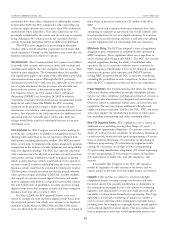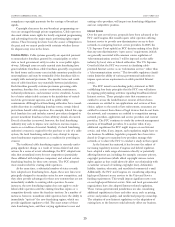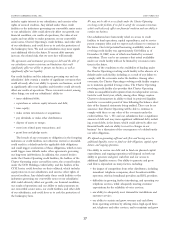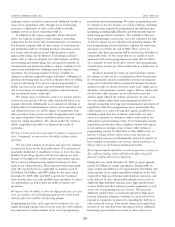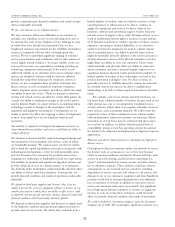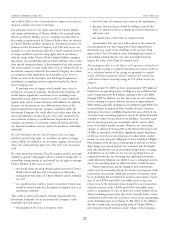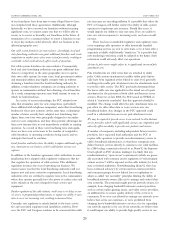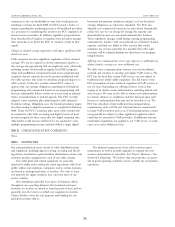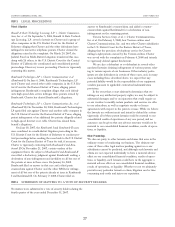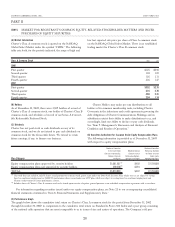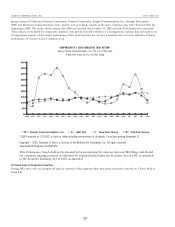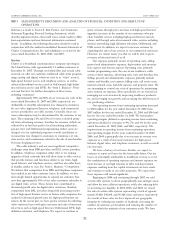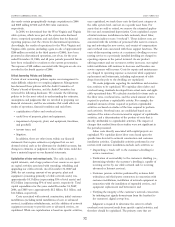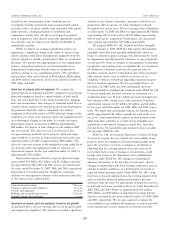Charter 2007 Annual Report Download - page 34
Download and view the complete annual report
Please find page 34 of the 2007 Charter annual report below. You can navigate through the pages in the report by either clicking on the pages listed below, or by using the keyword search tool below to find specific information within the annual report.
transactions, including whether Mr. Allen exchanges his Charter
Holdco units, are beyond our control.
The failure to maintain a minimum share price of $1.00 per share of
Class A common stock could result in delisting of our shares on the
NASDAQ Global Select Market, which would harm the market price
of Charter’s Class A common stock.
In order to retain our listing on the NASDAQ Global Select
Market we are required to maintain a minimum bid price of
$1.00 per share. Although, as of February 25, 2008, the trading
price of Charter’s Class A common stock was $1.06 per share,
our stock has traded near or below this $1.00 minimum in the
recent past. If the bid price falls below the $1.00 minimum for
more than 30 consecutive trading days, we will have 180 days to
satisfy the $1.00 minimum bid price for a period of at least 10
trading days. If we are unable to take action to increase the bid
price per share (either by reverse stock split or otherwise), we
could be subject to delisting from the NASDAQ Global Select
Market.
The failure to maintain our listing on the NASDAQ Global
Select Market would harm the liquidity of Charter’s Class A
common stock and would have adverse effect on the market
price of our common stock. If the stock were to trade it would
likely trade on the OTC “pink sheets,” which provide signifi-
cantly less liquidity than does NASDAQ. As a result, the liquidity
of our common stock would be impaired, not only in the number
of shares which could be bought and sold, but also through
delays in the timing of transactions, reduction in security analysts’
and news media’s coverage, and lower prices for our common
stock than might otherwise be attained. In addition, our common
stock would become subject to the low-priced security or so-
called “penny stock” rules that impose additional sales practice
requirements on broker-dealers who sell such securities.
Risks Related to Mr. Allen’s Controlling Position
The failure by Mr. Allen to maintain a minimum voting and economic
interest in us could trigger a change of control default under our subsid-
iary’s credit facilities.
The Charter Operating credit facilities provide that the failure by
(a) Mr. Allen, (b) his estate, spouse, immediate family members
and heirs and (c) any trust, corporation, partnership or other
entity, the beneficiaries, stockholders, partners or other owners of
which consist exclusively of Mr. Allen or such other persons
referred to in (b) above or a combination thereof to maintain a
35% direct or indirect voting interest in the applicable borrower
would result in a change of control default. Such a default could
result in the acceleration of repayment of our and our subsidiar-
ies’ indebtedness, including borrowings under the Charter Oper-
ating credit facilities.
Mr. Allen controls the majority of our stockholder votes and may have
interests that conflict with the interests of the other holders of Charter’s
Class A common stock.
Mr. Allen has the ability to control us. Through his control, as of
December 31, 2007, of approximately 91% of the voting power
of our capital stock, Mr. Allen is entitled to elect all but one of
Charter’s board members and has the voting power to elect the
remaining board member as well. Mr. Allen thus has the ability
to control fundamental corporate transactions requiring equity
holder approval, including, but not limited to, the election of all
of our directors, approval of merger transactions involving us and
the sale of all or substantially all of our assets.
Mr. Allen is not restricted from investing in, and has
invested in, and engaged in, other businesses involving or related
to the operation of cable television systems, video programming,
high-speed Internet service, telephone or business and financial
transactions conducted through broadband interactivity and
Internet services. Mr. Allen may also engage in other businesses
that compete or may in the future compete with us.
Mr. Allen’s control over our management and affairs could
create conflicts of interest if he is faced with decisions that could
have different implications for him, us and the other holders of
Charter’s Class A common stock. For example, if Mr. Allen were
to elect to exchange his Charter Holdco membership units for
Charter’s Class B common stock pursuant to our existing
exchange agreement with him, such a transaction would result in
an ownership change for income tax purposes, as discussed
above. See “– For tax purposes, there is significant risk that we
will experience a deemed ownership change resulting in a
material limitation on the use of a substantial amount of our
existing net operating loss carryforwards.” Further, Mr. Allen
could effectively cause us to enter into contracts with another
entity in which he owns an interest, or to decline a transaction
into which he (or another entity in which he owns an interest)
ultimately enters.
Current and future agreements between us and either
Mr. Allen or his affiliates may not be the result of arm’s-length
negotiations. Consequently, such agreements may be less favor-
able to us than agreements that we could otherwise have entered
into with unaffiliated third parties.
We are not permitted to engage in any business activity other than the
cable transmission of video, audio and data unless Mr. Allen autho-
rizes us to pursue that particular business activity, which could
adversely affect our ability to offer new products and services outside of
the cable transmission business and to enter into new businesses, and
could adversely affect our growth, financial condition and results of
operations.
Our certificate of incorporation and Charter Holdco’s limited
liability company agreement provide that Charter and Charter
Holdco and our subsidiaries, cannot engage in any business
activity outside the cable transmission business except for speci-
fied businesses. This will be the case unless Mr. Allen consents to
our engaging in the business activity. The cable transmission
business means the business of transmitting video, audio (includ-
ing telephone services), and data over cable television systems
owned, operated, or managed by us from time to time. These
provisions may limit our ability to take advantage of attractive
business opportunities.
CHARTER COMMUNICATIONS, INC. 2007 FORM 10-K
23



